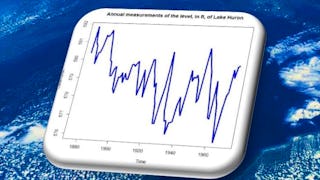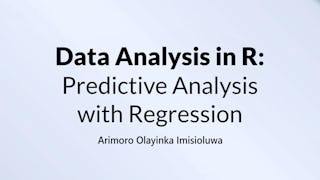By the end of this course, learners will be able to define the fundamentals of forecasting, classify forecasting methods, apply regression and decomposition techniques, and implement advanced models like ARIMA and SARIMA to accurately predict time-dependent data.



What you'll learn
Define forecasting fundamentals and classify methods for time-dependent data.
Apply regression, decomposition, and exponential smoothing in R.
Implement ARIMA and SARIMA models with ACF/PACF diagnostics for accuracy.
Skills you'll gain
Details to know

Add to your LinkedIn profile
September 2025
11 assignments
See how employees at top companies are mastering in-demand skills

There are 3 modules in this course
This module introduces learners to the fundamental principles of forecasting within the field of business analytics. It explains the purpose and scope of forecasting, explores different forecasting methods, and highlights common challenges businesses face when predicting future trends. Learners will also gain practical insights into simple forecasting approaches, transformations, and accuracy evaluation techniques, building a strong foundation for advanced forecasting models.
What's included
12 videos4 assignments1 plugin
This module explores how regression techniques and decomposition methods can be applied to time series forecasting. Learners will gain an in-depth understanding of simple, multiple, and non-linear regression, the use of predictors and lagged variables, and the unique considerations of time series regression. The module also introduces decomposition approaches to separate time series into trend, seasonal, cyclical, and irregular components, helping learners build accurate and interpretable forecasting models in R.
What's included
12 videos4 assignments
This module focuses on advanced time series forecasting techniques, including exponential smoothing, ARIMA, and Seasonal ARIMA models. Learners will explore the theoretical foundations and practical applications of autoregressive and moving average models, understand the role of ACF and PACF in model selection, and learn how to handle seasonal and non-seasonal time series data. By mastering these advanced methods, learners will be able to build robust and accurate forecasting models in R that address both short-term fluctuations and long-term seasonal trends.
What's included
8 videos3 assignments
Explore more from Data Analysis
 Status: Free Trial
Status: Free TrialCoursera Instructor Network
 Status: Preview
Status: PreviewThe State University of New York

Coursera Project Network
Why people choose Coursera for their career





Open new doors with Coursera Plus
Unlimited access to 10,000+ world-class courses, hands-on projects, and job-ready certificate programs - all included in your subscription
Advance your career with an online degree
Earn a degree from world-class universities - 100% online
Join over 3,400 global companies that choose Coursera for Business
Upskill your employees to excel in the digital economy
Frequently asked questions
To access the course materials, assignments and to earn a Certificate, you will need to purchase the Certificate experience when you enroll in a course. You can try a Free Trial instead, or apply for Financial Aid. The course may offer 'Full Course, No Certificate' instead. This option lets you see all course materials, submit required assessments, and get a final grade. This also means that you will not be able to purchase a Certificate experience.
When you purchase a Certificate you get access to all course materials, including graded assignments. Upon completing the course, your electronic Certificate will be added to your Accomplishments page - from there, you can print your Certificate or add it to your LinkedIn profile.
You will be eligible for a full refund until two weeks after your payment date, or (for courses that have just launched) until two weeks after the first session of the course begins, whichever is later. You cannot receive a refund once you’ve earned a Course Certificate, even if you complete the course within the two-week refund period. See our full refund policy.
More questions
Financial aid available,




